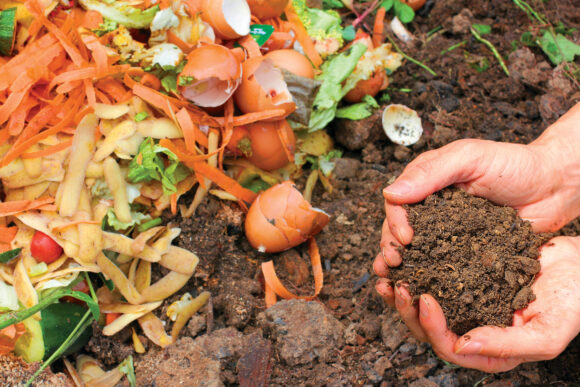The New Jersey Climate Change Alliance, which is facilitated by the Rutgers Climate Institute and Rutgers University’s Edward J. Bloustein School of Planning and Public Policy, announces the availability of a “Sustainable Organic Material Management Plan,” which coincides with the effective date of the New Jersey Food Waste Recycling Law or disposal ban legislation.
October 14, 2021, marks the effective date of the New Jersey Food Waste Recycling Law signed by Governor Phil Murphy on April 20, 2020. The law requires large food waste generators of 52 tons per calendar year to recycle their food waste provided an authorized facility is located within 25 road miles of their location and the cost is not more than 10 percent of what they are currently paying for landfill or incinerator disposal.
Recognizing the importance of this new law, the New Jersey Climate Change Alliance Organics Workgroup was created in August 2020 as a voluntary effort of 80 stakeholder organizations with a common goal of outlining a statewide “Sustainable Organic Material Management Plan” (SOMMP) for New Jersey. Shortly thereafter, the NJDEP released its “Global Warming Response Act 80 x 50 Report” in October 2020, including a chapter dedicated to Waste and Agriculture. The timing of this release allowed the workgroup to consider and expand upon the recommended actions identified by the state. Stakeholder discussions were held between April 1 and June 3, resulting in some 70 overall considerations, further refined into 17 initial core “opportunities for action.”
“Nationally, USEPA advises that municipal waste landfills are the third-largest source of human-related methane emissions in the United States, accounting for approximately 15.1 percent of these emissions in 2018,” said Jeanne Herb, alliance co-facilitator and executive director of Environmental Analysis and Communications Group at the Edward J. Bloustein School of Planning and Public Policy at Rutgers University. “Any measures we can enact to reduce the amount of wasted food and to maximize composting will contribute to GHG emission reductions.”
“New Jersey is charting a new course for the future, with a stronger and more just environment at its center,” Shawn M. LaTourette, New Jersey’s Commissioner of Environmental Protection said. “That future includes a new approach to reducing food waste, which will avoid land filling, reduce greenhouse gas emissions, and create new business opportunities in the process.”
“History has shown us time and again that we can do great things when we work together,” said Valerie Montecalvo, president and CEO of Bayshore Recycling, who organized the workgroup effort. “The climate crisis confronting our state, nation and world presents a call to action of unprecedented proportion, our plan of attack, sustainable living. In our fight, every action toward mitigation or adaptation counts toward our common goal to preserve, protect and enhance our environment and natural systems for generations to come. Volunteerism and unifying common vision are among our strongest assets.”
“Today represents a new beginning as our Food Waste Recycling Law takes effect and New Jersey begins a concerted effort to reduce wasted food and recycle, as opposed to disposing of organics in landfills and incinerators,” said Marie Kruzan, executive director of the Association of New Jersey Recyclers. “Our Climate Alliance Organics Plan provides us with an initial pathway to advance the goals of the new law and to attack the reduction of GHG emissions attributable to wasted food.
More sustainable management of food can feed more New Jerseyans confronting food insecurity and improve soil quality to enhance agriculture, community gardening, and plant growth through the use of compost.
“Compost enriches soil while helping retain moisture and suppressing plant diseases and pests, reduces the need for chemical fertilizers and reduces methane emissions from landfills while lowering our collective carbon footprint,” said Jairo Gonzalez, president of the New Jersey Composting Council. “Working cooperatively with state, county and local officials, we hope to show sustainable organics management is a win for not only our environment but also our economy and well-being.”
While the stakeholder effort was focused on planning, identifying practical ways to advance more sustainable organic material management was the objective.
“Our Sustainable Jersey programs now actively engage 460 New Jersey municipalities, 1,025 schools and 374 school districts,” said Randy Solomon, executive director. “We currently offer practical actions for towns and schools to take to reduce and recycle food waste. The Organics Workgroup effort will undoubtedly result in additional actions developed to promote even more sustainable management practices which can dramatically advance our GHG emission reduction and environmental goals.
Montecalvo summed up the Workgroup effort and future direction: “While we hope you find our work to be informative, it has clearly just begun! Framing a plan of action is a critical first step, but the rubber hits the road through action and implementation. It is now time to collectively roll up our sleeves and get to the real work of effecting positive change.”
The Sustainable Organic Material Management Plan can be found here: Organics Workgroup SOMMP
The New Jersey Climate Change Alliance is a network of diverse organizations that share the goal of advancing science-informed climate change strategies at the state and local levels in New Jersey, with regard to adapting to changing climate conditions and addressing the emissions that cause climate change. Alliance participants include representatives of public, private and non-governmental New Jersey organizations from sectors including transportation, emergency managements, business, energy, engineering, farming, insurance, environment, health, community planning, Environmental Justice, natural resource management, and others. The Alliance does not work to influence political outcomes or specific pieces of legislation; rather, the work of the Alliance serves to integrate science with evidence and diverse points of view through the voices of Alliance participants for the purpose of informing short and long-term climate change strategies and outlining policy options for New Jersey.


